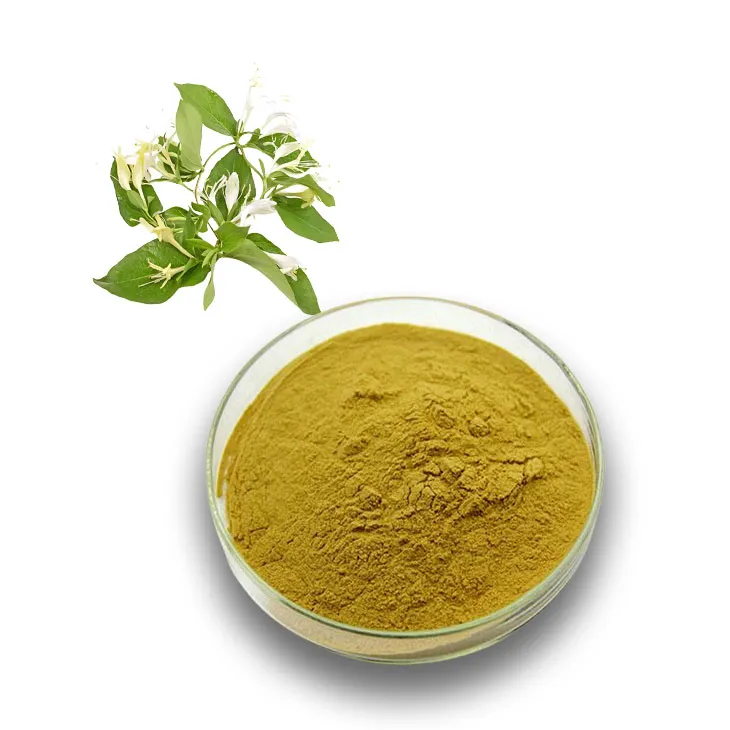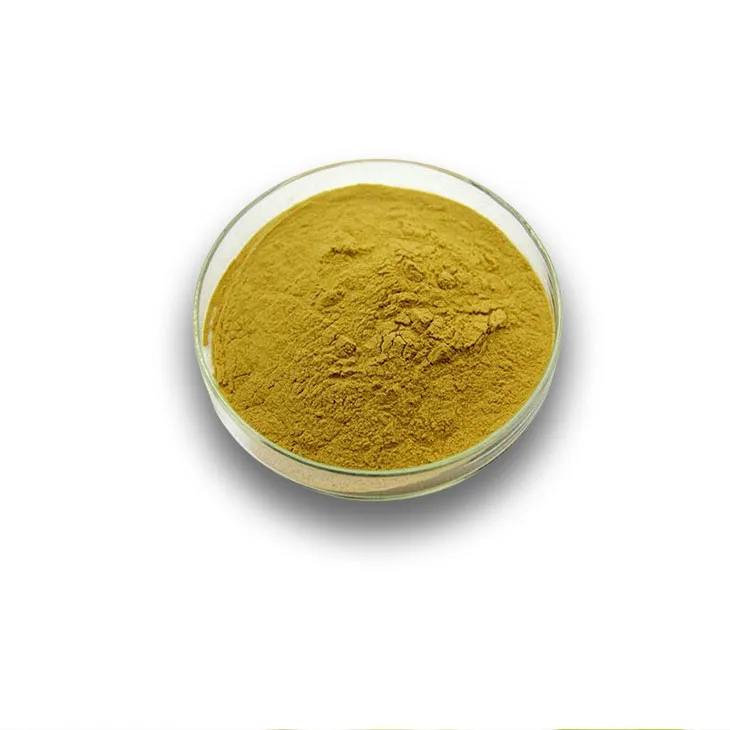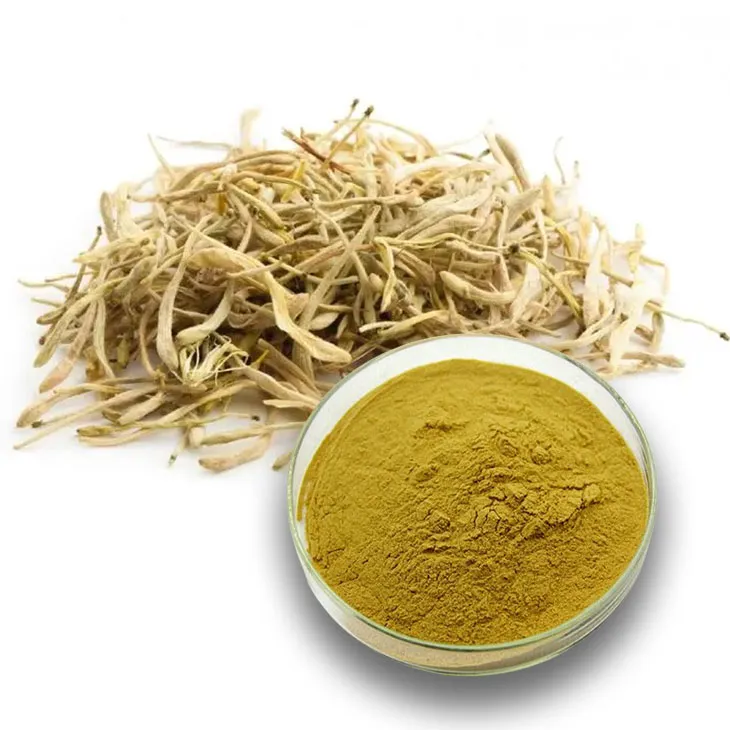- 0086-571-85302990
- sales@greenskybio.com
Five Efficacy of Honeysuckle Pollen + Dosage, Side Effects
2024-11-11

I. Introduction
Honeysuckle Pollen is a natural substance that has been used in traditional medicine for centuries. It is rich in nutrients and bioactive compounds, which endow it with various health - promoting properties. In this article, we will explore the five main efficacies of Honeysuckle Pollen, as well as the appropriate dosage and potential side effects, aiming to provide a comprehensive understanding for those who are interested in this natural remedy.

II. The Five Efficacies of Honeysuckle Pollen
1. Anti - inflammatory Effects
Honeysuckle pollen contains certain anti - inflammatory substances. Inflammation is a natural response of the body to injury or infection, but chronic inflammation can lead to various diseases. The anti - inflammatory components in honeysuckle pollen can help to reduce inflammation at the cellular level. For example, it may be beneficial for those with inflammatory conditions such as arthritis. Studies have shown that the bioactive compounds in honeysuckle pollen can inhibit the production of pro - inflammatory cytokines, which are molecules that play a crucial role in the inflammatory process. By suppressing these cytokines, honeysuckle pollen can potentially relieve pain and swelling associated with inflammation.
2. Antioxidant Properties
Our bodies are constantly exposed to free radicals, which are unstable molecules that can cause oxidative stress. Oxidative stress is linked to many health problems, including aging, cancer, and cardiovascular diseases. Honeysuckle pollen is a rich source of antioxidants, such as flavonoids and phenolic acids. Antioxidants work by neutralizing free radicals, preventing them from causing damage to cells and tissues. The antioxidant capacity of honeysuckle pollen can help to protect the body's cells from oxidative damage, thereby maintaining their normal function. This may contribute to overall health and well - being, and may also have a preventive effect on certain chronic diseases.
3. Immune - boosting Function
The immune system is our body's defense against diseases. Honeysuckle pollen can enhance the immune system in several ways. It contains nutrients like vitamins, minerals, and amino acids that are essential for the proper functioning of immune cells. Additionally, certain bioactive compounds in honeysuckle pollen can stimulate the production and activity of immune cells, such as lymphocytes and macrophages. By strengthening the immune system, honeysuckle pollen can help the body to better resist infections, including bacterial, viral, and fungal infections. This makes it a potentially useful supplement, especially during the cold and flu season or for people with weakened immune systems.
4. Skin - health Promotion
Good skin health is not only about appearance but also reflects the overall health of the body. Honeysuckle pollen has beneficial effects on the skin. Its antioxidant properties help to protect the skin from damage caused by environmental factors such as UV radiation and pollution. Moreover, the anti - inflammatory effect of honeysuckle pollen can be beneficial for skin conditions like acne, eczema, and psoriasis, which are often associated with inflammation. Honeysuckle pollen may also promote skin cell regeneration, resulting in a more youthful and healthy - looking complexion. It can be used both internally and topically for skin health. For example, some skincare products may contain honeysuckle pollen extract.
5. Digestive Support
Honeysuckle pollen can play a positive role in maintaining a healthy digestive system. It contains dietary fiber, which can help to promote regular bowel movements and prevent constipation. Additionally, the anti - inflammatory and antibacterial properties of honeysuckle pollen can be beneficial for the gut. It can help to reduce inflammation in the digestive tract and combat harmful bacteria, thus promoting a healthy gut microbiota. A healthy gut is crucial for proper digestion, absorption of nutrients, and overall health. Some people may experience improved digestion and reduced gastrointestinal discomfort after taking honeysuckle pollen.

III. Dosage of Honeysuckle Pollen
The appropriate dosage of honeysuckle pollen can vary depending on several factors, such as the individual's age, health condition, and the purpose of use.
1. General Adult Dosage
For general health maintenance, a typical dosage for adults may be around 5 - 10 grams per day. This can be taken in divided doses, for example, 2 - 3 grams in the morning and 3 - 7 grams in the evening. However, if using honeysuckle pollen for a specific health condition, such as immune - boosting during a cold, a slightly higher dosage may be considered, but it should not exceed 15 grams per day without medical advice.
2. Dosage for the Elderly
The elderly may need a more conservative dosage due to potential differences in metabolism and overall health. A starting dosage of around 3 - 5 grams per day is often recommended. As with any supplement, it is important to monitor for any adverse effects and adjust the dosage accordingly.
3. Dosage for Children
For children, the dosage should be adjusted based on their age and weight. As a general guideline, children between the ages of 6 - 12 years may start with a dosage of 1 - 3 grams per day. For younger children, it is advisable to consult a pediatrician before giving honeysuckle pollen, as their digestive and immune systems are still developing.

IV. Side Effects of Honeysuckle Pollen
While honeysuckle pollen is generally considered safe for most people, there are some potential side effects that should be noted.
1. Allergic Reactions
Some individuals may be allergic to honeysuckle pollen. Allergic reactions can range from mild symptoms such as skin rashes, itching, and sneezing to more severe reactions like difficulty breathing and anaphylactic shock. People with known pollen allergies, especially those allergic to other types of pollen, should be cautious when using honeysuckle pollen. If any signs of an allergic reaction occur, use should be discontinued immediately and medical attention sought.
2. Gastrointestinal Disturbances
In some cases, taking honeysuckle pollen may cause mild gastrointestinal disturbances. This can include symptoms such as nausea, abdominal discomfort, or diarrhea. These symptoms are usually mild and may resolve on their own. However, if they persist or become severe, it is advisable to stop taking the pollen and consult a healthcare provider. To minimize the risk of gastrointestinal side effects, it is recommended to start with a low dosage and gradually increase it as the body adjusts.
3. Interaction with Medications
Honeysuckle pollen may interact with certain medications. For example, if a person is taking medications for blood thinning, such as warfarin, the anti - coagulant effect may be enhanced by honeysuckle pollen, increasing the risk of bleeding. It is crucial for those taking medications to consult their doctor or pharmacist before using honeysuckle pollen to avoid any potential drug - pollen interactions.

V. Conclusion
Honeysuckle pollen offers several potential health benefits, including anti - inflammatory, antioxidant, immune - boosting, skin - health promotion, and digestive support. However, it is important to use it in the appropriate dosage to ensure safety and effectiveness. While side effects are relatively rare, allergic reactions, gastrointestinal disturbances, and potential drug interactions should be considered. As with any natural remedy, it is always advisable to consult a healthcare professional before starting to use honeysuckle pollen, especially for those with pre - existing health conditions or those taking medications.
FAQ:
What are the five efficacies of honeysuckle pollen?
Honeysuckle pollen may have the following efficacies: antioxidant effect, which can help fight against free radicals in the body; anti - inflammatory property, potentially reducing inflammation in the body; it may also have a certain role in enhancing immunity, helping the body better resist diseases; may contribute to improving digestion, such as promoting the secretion of digestive juices; and might have a positive impact on skin health, for example, making the skin look more radiant.
How should honeysuckle pollen be dosed?
The dosage of honeysuckle pollen can vary depending on different factors. Generally, for adults, a common starting dosage might be around 5 - 10 grams per day. However, it is best to consult a healthcare professional or a pharmacist for personalized advice, especially for those with special health conditions or those taking other medications.
What are the possible side effects of honeysuckle pollen?
Some people may experience allergic reactions to honeysuckle pollen, such as skin rashes, itching, swelling, or respiratory problems like sneezing and shortness of breath. In addition, excessive consumption may lead to digestive discomfort, including nausea, vomiting, or diarrhea.
Can everyone take honeysuckle pollen?
No, not everyone can take honeysuckle pollen. People with pollen allergies are at high risk of having an allergic reaction to it. Also, pregnant or breastfeeding women should be cautious and consult a doctor before taking it, as there may be potential effects on the fetus or infant.
How to store honeysuckle pollen?
Honeysuckle pollen should be stored in a cool, dry place, away from direct sunlight. It is best to keep it in an airtight container to prevent moisture absorption and spoilage. Storing it in the refrigerator can also be a good option to prolong its shelf life.
Related literature
- The Health Benefits of Honeysuckle Pollen: A Comprehensive Review"
- "Dosage Considerations in Honeysuckle Pollen Consumption"
- "Side Effects of Herbal Products: Focus on Honeysuckle Pollen"
- ▶ Hesperidin
- ▶ Citrus Bioflavonoids
- ▶ Plant Extract
- ▶ lycopene
- ▶ Diosmin
- ▶ Grape seed extract
- ▶ Sea buckthorn Juice Powder
- ▶ Fruit Juice Powder
- ▶ Hops Extract
- ▶ Artichoke Extract
- ▶ Mushroom extract
- ▶ Astaxanthin
- ▶ Green Tea Extract
- ▶ Curcumin
- ▶ Horse Chestnut Extract
- ▶ Other Product
- ▶ Boswellia Serrata Extract
- ▶ Resveratrol
- ▶ Marigold Extract
- ▶ Grape Leaf Extract
- ▶ New Product
- ▶ Aminolevulinic acid
- ▶ Cranberry Extract
- ▶ Red Yeast Rice
- ▶ Red Wine Extract
-
Bamboo Leaf extract
2024-11-11
-
Troxerutin
2024-11-11
-
Cassia Seed Extract
2024-11-11
-
Grape Leaf Extract
2024-11-11
-
Carrageenan Extract Powder
2024-11-11
-
Tormentil Extract
2024-11-11
-
Oyster Mushroom Extract Powder
2024-11-11
-
Baicalin
2024-11-11
-
Mangosteen extract powder
2024-11-11
-
Dan Shen Root Extract/Salvia Root Extract
2024-11-11





















